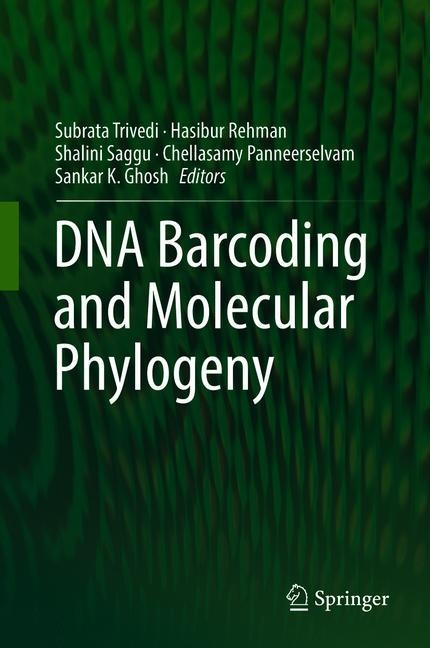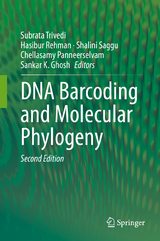
DNA Barcoding and Molecular Phylogeny
Springer International Publishing (Verlag)
978-3-319-90679-9 (ISBN)
- Titel erscheint in neuer Auflage
- Artikel merken
Dr. Subrata Trivedi completed B. Sc. (Hons) and M.Sc. from University of Calcutta, M.Phil from Jadavpur University (India) and Ph.D in Molecular Biology from Hiroshima University, Japan. He is recipient of Japanese Government (Monbusho) Scholarship, B.B.C. World Service (London) Scholarship and Scholarship from Ministry of Environment and Forests (Govt. of India). He discovered five new genes encoding vanadium binding proteins. Dr. Trivedi handled eight major projects as PI and Co-PI. He has more than 140 publications including peer reviewed research papers, conference papers, book chapters and books. He is reviewer of several journals like PLOS One, Molecular Biology Reports, Mitochondrial DNA, Tumor Biology, DNA Barcodes, etc. He is also editorial board member of several international journals and member of many international societies. He has taught in several universities and presently working as Assistant Professor in the Department of Biology, University of Tabuk. Dr. Hasibur Rehman completed M.Sc. and Ph.D from Jamia Hamdard, University, New Delhi, India in Toxicology. He served as a Staff Scientist at Center for Cell Death, Injury and Regeneration, Department of Pharmaceutical & Biomedical Sciences, Medical University of South Carolina, Charleston, SC, USA His research interests are on the mechanisms of cell injury, death and regeneration, with foci on the roles of free radicals and mitochondrial function in liver and kidney diseases and development of novel therapeutics to prevent injury and accelerate the regeneration/repair processes. Dr. Rehman handled several major projects as PI and Co-PI. He has more than 150 publications including peer reviewed research papers, conference papers, book chapters and books. He is reviewer of several journals like, Food and Chemical Toxicology, Chemosphere, Toxicology, PLOS One, Frontiers of Gastrointestinal Pharmacology, etc. He is also editorial board member of several international journals and member of many international societies. He has taught in several universities and presently working as an Assistant Professor in the Department of Biology, University of Tabuk, Saudi Arabia. Dr. Shalini Saggu completed her M.Sc. and Ph.D from Jamia Hamdard, University, New Delhi, India in Toxicology. She served as a Postdoctoral fellow at University of Louisville, KY, USA, later she joined as a Staff Scientist at Center for Cell Death, Injury and Regeneration, Department of Pharmaceutical & Biomedical Sciences, Medical University of South Carolina, Charleston, SC, USA. Her research interest to investigate the mechanisms of cell injury and cell death in various pathological settings, mostly related to cancer. Specifically, interested in treating skin cancers with photodynamic therapy. Dr. Saggu handled several major projects as PI and Co-PI. She has more than 90 publications including peer reviewed research papers, conference papers, book chapters and books. She is reviewer of several journals like Toxicology, Food and Chemical Toxicology, Toxicology Letters etc. She is also editorial board member of several international journals and member of many international societies. Presently, she is working as an Assistant Professor in the Department of Biology, University of Tabuk, Saudi Arabia. Dr. Chellasamy Panneerselvam is an Assistant Professor in the Department of Biology at the University of Tabuk. He has more than 5 years of experience in R&D related to phytochemistry and nanomaterials for insect pest management. He obtained his B.Sc., M.Sc and M. Phil degrees from Madurai Kamaraj University, India and Ph.D degree from Bharathiar University, India. He has won gold medal for best Ph.D thesis in Zoology. He worked as UGC-Post-Doctoral fellow (PDF) and Senior Research Fellow (SRF) at DRDO-BU Campus and has published over 75 peer-reviewed papers, 10 Book Chapters. He is peer-reviewer of many International Reputed Journals includ
DNA BARCODING AND MOLECULAR PHYLOGENY CONTENTS Section 1: DNA Barcoding: Advantages and Significance1. DNA Barcoding Advantages and Significance
SambaShiva Daravath, Reddya Naik, Tamil Selvi Manickam, and Srinivas Ankanagari 2. R in DNA BarcodingAsim Kr Mahadani, Pradosh Mahadani, Goutam Sanyal3. Implications and utility of DNA Barcoding
J. Suriya,1* M. Krishnan,1 S. Bharathiraja,2 V. Sekar3 and V Sachithanandam3 4. Significance of DNA Barcoding in Avian species: Tracing the history and building the future
Farhina Pasha5. DNA Barcoding: A potential tool for invasive species identificationMuniyandi Nagarajan* Akash Nambidi ParambathSection 2: DNA Barcoding of Microbes6. Microbial DNA Barcoding: Prospects for Discovery and Identification Anand Mohan*1, Bableen Flora1, Madhuri Girdhar2, S. M. Bhatt37. DNA Barcoding on Bacteria and its Application in infection management
Mohammad Zubair, Farha Fatima, Shamina Begum, Zahid Hameed SiddiquiSection 3: DNA Barcoding in Plants8. DNA Barcoding: Implications in plant-animal interactions
Muniyandi Nagarajan1* Vandana R Prabhu1, Ranganathan Kamalakkannan1 and Palatty Allesh Sinu29. DNA barcoding in forensic botany
Mohamed Rizk Enan10. A Molecular Assessment of Red Algae with reference to the utility of DNA Barcoding
Zahid H. Siddiqui1, Zahid K. Abbas1, Khalid R. Hakeem2, Mather A. Khan3, Md. Abdul Ilah411. DNA Databases: Promises and Limitations for Plant DNA Barcoding
Selvaraj Dhivya, Mohanasundaram Saravanan and Ramalingam Sathishkumar*12. Aquatic Plant Biodiversity and DNA Barcoding
Sufia Irfan*, Aishah AlatawiSection 4: DNA Barcoding in Animals 13. DNA barcoding of mosquito species
Lalita Gupta and Sanjeev Kumar14. DNA barcoding of Rays from South China Sea
1Akbar John, B*., 2MUHAMAD ASRUL, M.A., 4Wahidah Mohd Arshaad, 2Jalal, K.C.A. 3Hassan I. Sheikh15. Molecular phylogeny of Elasmobranchs
Pavan Kumar, A1*., Gireesh-Babu,P1., Jaiswar, A. K2., Raje, S.G3., Chaudahri,A1., and Krishna, G1.16. A Review on DNA Barcoding on fish taxonomy in India
V.Sachithanandam1,2* and P.M.Mohan217. Applications of DNA barcoding in fisheries
Pavan-Kumar, A*., Jaiswar, A. K., Gireesh-Babu,P., Chaudahri,A., and Krishna, G.18. Identification and conservation of reptiles through DNA BarcodingSubrata Trivedi1, Hasibur Rehman1, Shalini Saggu1, Al Thabiani Aziz1, Chellasamy Panneerselvam1, Sankar K. Ghosh219. DNA Barcoding in Avian species with special reference to Taxonomically-wide Biogeographic Studies
Farhina Pasha20. Molecular characterization of ruminant mammals using DNA barcodes
Muniyandi Nagarajan, Nimisha K, Subhash ThomasSection 5: Case Studies 21. Phylogenetic diversity of culturable marine actinobacteria isolated from the Havelock Island, the Andamans, India
Rajagopal Gobalakrishnan and Kannan Sivakumar22. DNA Barcoding and Molecular Phylogeny of Indigenous bacteria in Fishes from a Tropical Tidal River in Malaysia
Mohammad Mustafizur Rahman1,2,*, Mohd Haikal Izzuddin3, Najmus Sakib Khan3, Akbar John2, Mohd Azrul Naim323. DNA barcoding of Ichtyoplankton and Juvenile fishes of Tropical river in Malaysia1Akbar John, B*., 2Hassan I. Sheikh, 1Jalal, K.C.A., 3Kamaruzzaman, B.Y., 2Sanower, H., 2Nur Hanisah, M., 3Rahman, M.H., 4Rozihan, M., 24. Genetic Variation of Wild and Hatchery Populations of Climbing Perch Anabas testudineus (Bloch 1792) in Peninsular Malaysia, using partial Gene of cytochrome b Ahmad Azfar Mohamed, Siti Waznah Abdurahman, Akbar John25. Molecular Identification of Reptiles from Tabuk Region of Saudi Arabia through DNA barcoding: A case studyBishal Dhar1, Mohua Chakraborty1, Madhurima Chakraborty1, Subrata Trivedi2 Abdulhadi A. Aloufi2, and Sankar K. Ghosh1,326. Hippophae rhamnoides (Sea-buckthorn) a high altitude medicinal, adaptogenic plant; Molecular characterization and bar-coding.Shweta Saxena1, Om Prakash Chaurasia1, Ratan Kumar227. Closing Shots – DNA Barcoding and Molecular Phylogeny Subrata Trivedi1*, Hasibur Rehman1, Shalini Saggu1, Chellasamy Panneerselvam1, Sankar K Ghosh2
| Erscheinungsdatum | 03.09.2018 |
|---|---|
| Zusatzinfo | VII, 442 p. 57 illus., 26 illus. in color. |
| Verlagsort | Cham |
| Sprache | englisch |
| Maße | 155 x 235 mm |
| Gewicht | 794 g |
| Themenwelt | Naturwissenschaften ► Biologie ► Zoologie |
| Schlagworte | Aquatic Plant Biodiversity • culturable marine actinobacteria • DNA barcoding • DNA Barcoding Application • fisheries • Fish taxonomy • forensic botany • Fungi • Insects • Limitations of DNA Barcoding • marine science • molecular phylogeny • plants • Software R |
| ISBN-10 | 3-319-90679-8 / 3319906798 |
| ISBN-13 | 978-3-319-90679-9 / 9783319906799 |
| Zustand | Neuware |
| Informationen gemäß Produktsicherheitsverordnung (GPSR) | |
| Haben Sie eine Frage zum Produkt? |
aus dem Bereich



